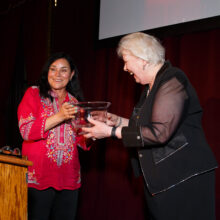Grandfather Mountain Highland Games 2023
The National Trust for Scotland Foundation USA was delighted to attend the Grandfather Mountain Highland Games in Linville, North Carolina, again this summer. Our friends at Scottish Heritage USA have invited us to join them at the Games – among the largest in the US – for many years now, and we’ve been able to bring over a range of expert speakers from the National Trust for Scotland, including Head of Archaeology Derek Alexander and Culloden’s Kat McIntosh, to speak about conservation work underway at the Trust.
This year, Chris Waddell of the Robert Burns Birthplace Museum made the trip over from Ayrshire, bringing the spirit of Scotland’s bard with him. Here is his account of his visit:
“My name is Chris Waddell, and I am the Learning Manager at the National Trust for Scotland’s Robert Burns Birthplace Museum in Alloway, Ayr. After a phone call with the Trust’s Head of Fundraising, I agreed to go on a trip to North Carolina to represent the National Trust for Scotland and the Robert Burns Birthplace Museum at the Grandfather Mountain Highland Games. This wasn’t a difficult decision to make; I leapt at the chance. I had heard about the Games from a colleague who had attended in a previous year, so I relished the opportunity to go. These visits are carried out annually, to allow an NTS representative to foster and establish new links with potential partners across the Atlantic. This work is vital; it allows us to garner support and hopefully strengthen those ties which lead to possible funding opportunities and cooperative working experiences.
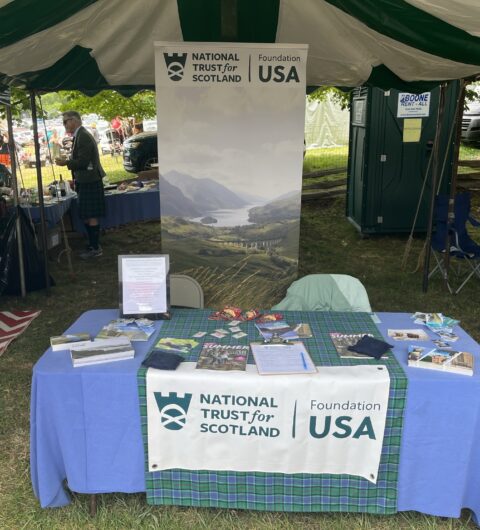
The NTSUSA table at the Grandfather Mountain Highland Games
Working alongside our partners from NTSUSA and Scottish Heritage USA (SHUSA), I helped man the NTSUSA tent. This provided me with an excellent opportunity to meet with people attending the Games, and to tell them how Americans help – through funding opportunities – the National Trust for Scotland deliver vital project work across our sites.
The Games themselves were a true spectacle, attended by tens of thousands of people from all across North America. These include dozens of Clan Societies, pipe bands, traditional musicians, crafts people, and of course the games competitors themselves. They are very different in some ways from the games we have here in Scotland. Significantly, the clan element is the most notable difference: our American cousins have a deep desire (naturally) to identify and connect with their roots. The various clan societies – dozens of whom were in attendance – provide people with opportunities to do this.
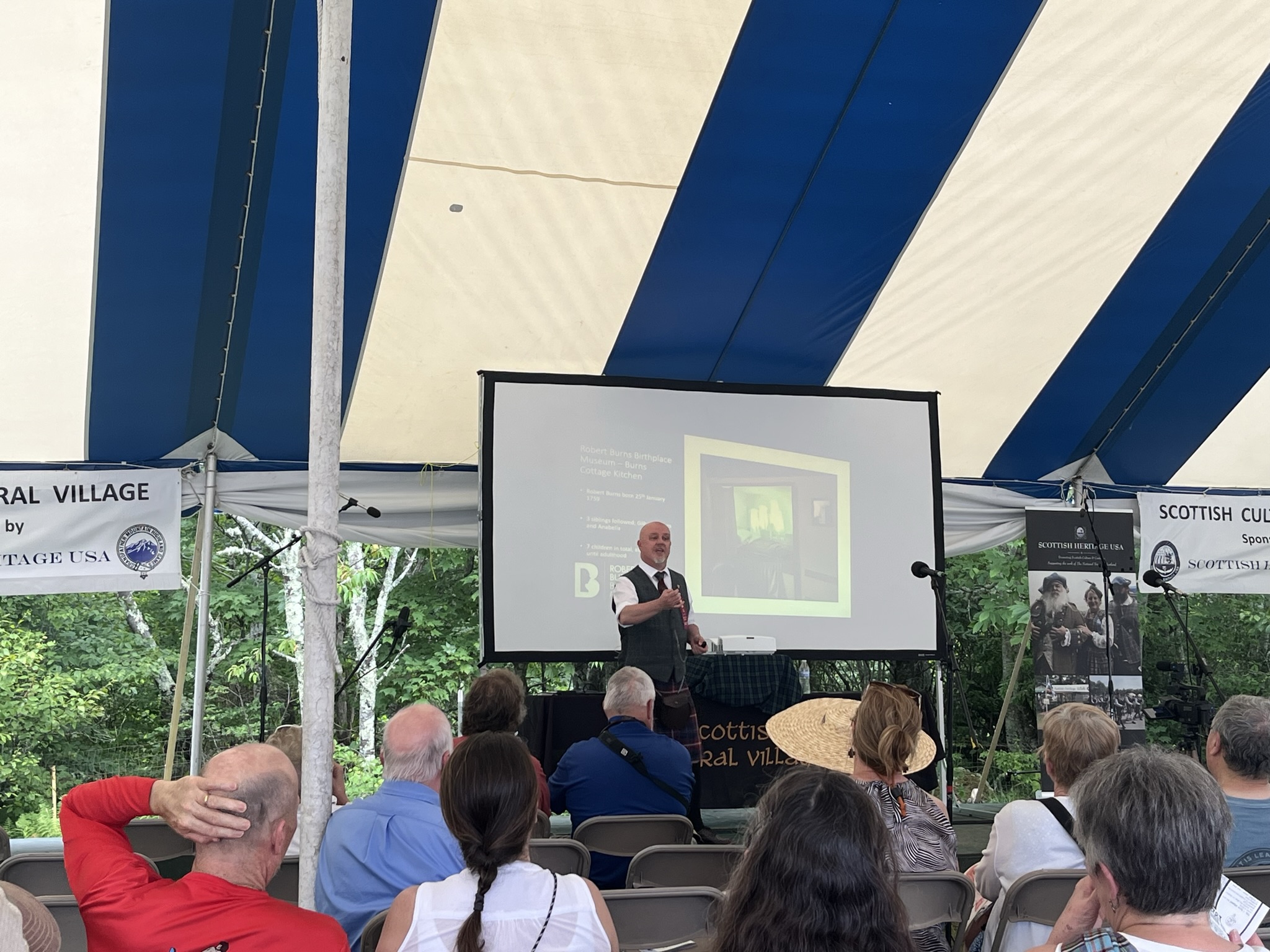
Chris Waddell delivering his talk
There are other differences; live music plays a big part in the proceedings. There are of course the many excellent pipe bands one would expect, but there are also two separate band stages where traditional and Celtic themed musicians – from Scotland and North America – play to crowds of enthusiastic attendees. In some ways, these Games have more the feel of a festival, with huge camping areas and a distinctly family appeal to them. I suspect the organizers of Highland Games in Scotland could learn a thing or two from this approach.
I had been asked to deliver a talk on Burns and the Birthplace Museum on two consecutive days in the Cultural Village tent. My contact for this was a lady called Betty Johnson, who merits a special mention. Betty runs the tent with split second timing and a professionalism that any general would be envious of! The consequence of this is that I just had to turn up at the allotted times to find all the sound and visual requirements for my presentation already in place. This is reflective of the hard work and commitment that SHUSA show at these Games. I cannot praise them enough. The talks program was excellent, I was proud to be part of it and I hope I did the organizers justice.
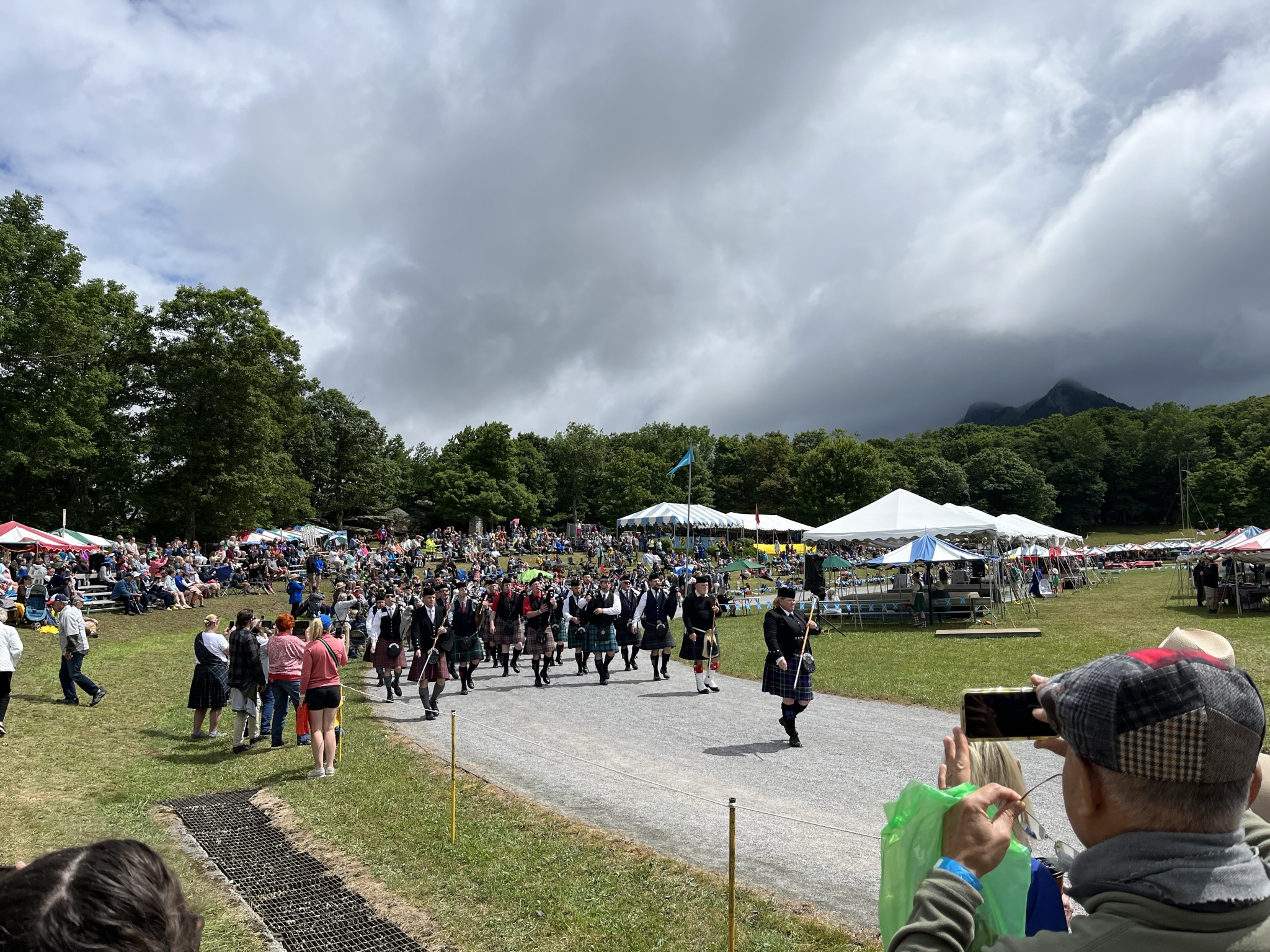
The parade at the Grandfather Mountain Highland Games
For the duration of my stay, I was hosted in beautiful cabin-house in the town of Banner Elk. My host was a gentleman (in the truest sense of the word) called Peter Wilson. Peter is a re-located Scot. Hailing from Bearsden originally, he moved to North Carolina in the 1970s, married a southern belle and settled to raise a family. He runs a successful import business, bringing Scottish goods to an eager ex-pat and descendant community and in doing so, displays the mercantile nous and hard work ethic that we Glaswegians are rightly famed for.
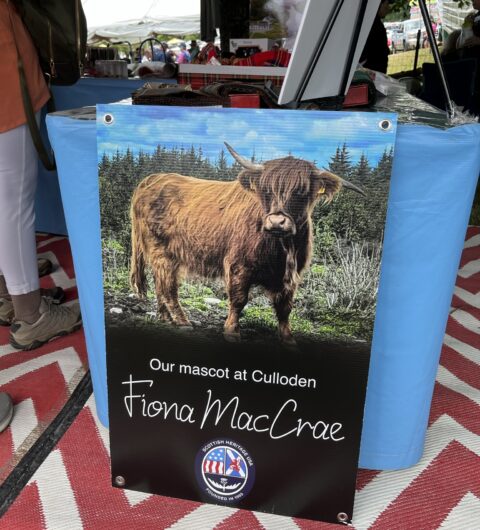
Peter is one of the driving forces behind SHUSA and helps to make this part of North Carolina the node of Scottish culture that it remains today. One need only look around Banner Elk and the surrounding area to find evidence of this in the place names – Grouse Moor Road, Tynecastle Drive, the Scotchman retail centre, the Tartan restaurant. Scotland’s genetic and cultural stamp is deeply imprinted on this beautiful corner of North Carolina.
I was able to enjoy the Southern Hospitality that this part of the world is famed for, I sampled a few drams, made some wonderful friends and of course, used this as a great opportunity to evangelise about our National Bard Robert Burns.
All of this, in conjunction with the Games, illustrated to me the deep affection in which Scotland is held in North Carolina. I felt quite humbled by the love and enthusiasm for Scotland shown by all who attended, performed, or competed in the games. On my last evening, I commented to Betty that I had spent a few days surrounded by thousands of Americans who were a little bit Scottish. I felt that after five amazing days, this Scotsman would return home feeling a little bit more American.
I would like to thank all of those who made my visit such a happy one: Peter Wilson, Betty Johnson, Sam Johnson, Gordon Kirkbright, Randi Lowery, Jen Begley, Andrew Morrison, Pat Apperson, Dan Henderson, the wonderful ladies in the SHUSA tent – Shannon, Eileen and Sylvia – and of course my excellent NTSUSA colleagues Sarah MacPhee and Lisa Bravata.”

